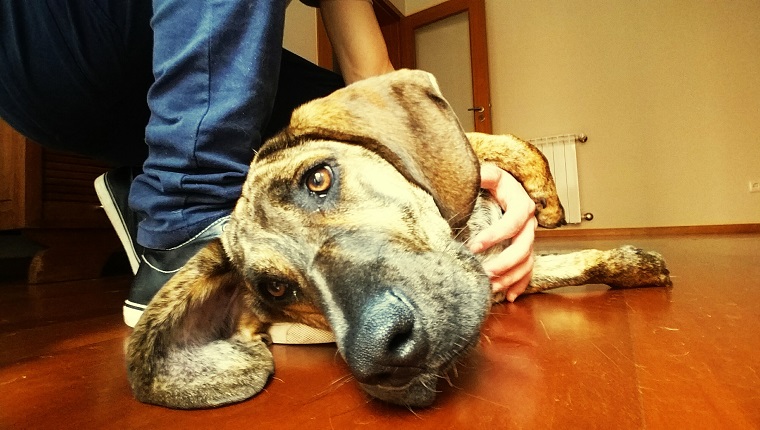Seizures in dogs are involuntary convulsions or fits where there’s a loss of muscle control due to an interruption of normal brain function. They may result in a loss of consciousness, but this is not always the case.
There are several reasons a dog might have seizures, though sometimes the cause is unknown. If the seizures keep recurring, they may be caused by a seizure disorder called epilepsy.
Seizures in dogs can be just twitches or mild shaking, or they can result in collapse and a complete loss of muscle control. They can last for seconds or several minutes. They’re very concerning and can be frightening to witness.
If your dog has a seizure or recurring seizures, you must consult your veterinarian so they can find the cause and prescribe treatment. Here’s what you should know about the symptoms, causes, and treatments for seizures in dogs.
Symptoms Of Seizures In Dogs

The symptoms of seizures in dogs can vary in intensity and length. Some are very mild and only last a short time, while others involve chaotic loss of muscle control and last for several minutes.
It may be hard to distinguish between a seizure and a fainting spell, though there are some differences. When dogs faint, they generally don’t look dazed or stare off before it happens. Dogs who faint generally recover quickly and usually don’t defecate during the episode.
Here are a few symptoms of seizures in dogs that may help you identify what’s going on:
- Collapse
- Jerking, stiffening, or twitching of muscles
- Loss of consciousness
- Drooling
- Vocalization
- Tongue chewing
- Foaming mouth
- Defecation or urination
- Paddling the legs
- Staring or looking dazed before the episode
- Disorientation, wobbliness, or temporary blindness after the episode
- Walking in circles after the episode
- Drool or blood from the mouth after the episode
- Hiding after the episode
These symptoms can vary depending on the type of seizure.
A generalized or grand mal seizure happens when there’s abnormal electrical activity in the entire brain, and often results in convulsions and a loss of consciousness that can last from seconds to several minutes.
Focal seizures only happen in one area of the brain and usually result in unusual movements from one limb or side of the body, though they can escalate into generalized seizures.
Causes Of Seizures In Dogs

There are many possible causes of seizures in dogs, but the most common cause is idiopathic epilepsy. The exact cause of idiopathic epilepsy isn’t known, but there’s a genetic component that makes some dogs predisposed to the condition.
Beagles, Belgian Tervurens, Golden Retrievers, Keeshonds, Shetland Sheepdogs, and Vizslas are the most at risk for idiopathic epilepsy, though Bernese Mountain Dogs, English Springer Spaniels, Finnish Spitz, and Irish Wolfhounds are also predisposed.
There are also several causes of seizures in dogs that are not genetic, including:
- Poisoning
- Liver disease
- Kidney disease
- Anemia
- Encephalitis
- Stroke
- Brain cancer
- Hypertension or hypotension
- Electrolyte issues
- Head injury
- Encephalitis
Treatments For Seizures In Dogs

If your dog has a seizure, it’s important that you keep them as safe as possible. Move them away from furniture, stairs, or anything else that might pose a risk to their safety.
Do not touch their mouth or head or put anything in their mouth. Dogs will not choke on their own tongues, and you may get bit if you’re anywhere near their mouth.
If the seizure lasts several minutes, try putting cold water on your dog’s paws, as they may start to overheat. Speak gently to your dog and touch them away from the head to reassure them.
Get to the vet as soon as the seizure stops. The longer seizures continue, the greater the risk of overheating and brain damage. A vet may give your dog Valium intravenously to stop a seizure.
Treatment for seizures in dogs will depend on the underlying cause. In the case of idiopathic epilepsy, your vet may prescribe anti-epileptic medication like phenobarbital or potassium bromide.
Follow your vet’s instructions closely, and be aware that long-term use of these medications can result in weight gain, so you’ll need to monitor your dog’s weight. Your vet may prescribe dietary changes. It’s also recommended that epileptic dogs do not swim, as they may drown if they have an episode in the water.
Other underlying causes will be treated differently. Some conditions may require medication or dietary changes. Other serious conditions such as cancer may require chemotherapy or surgery.
Once your vet forms a proper diagnosis, they can advise a treatment plan to prevent seizures in the future.
Has your dog ever suffered from a seizure? How did you treat it? Let us know in the comments below!









